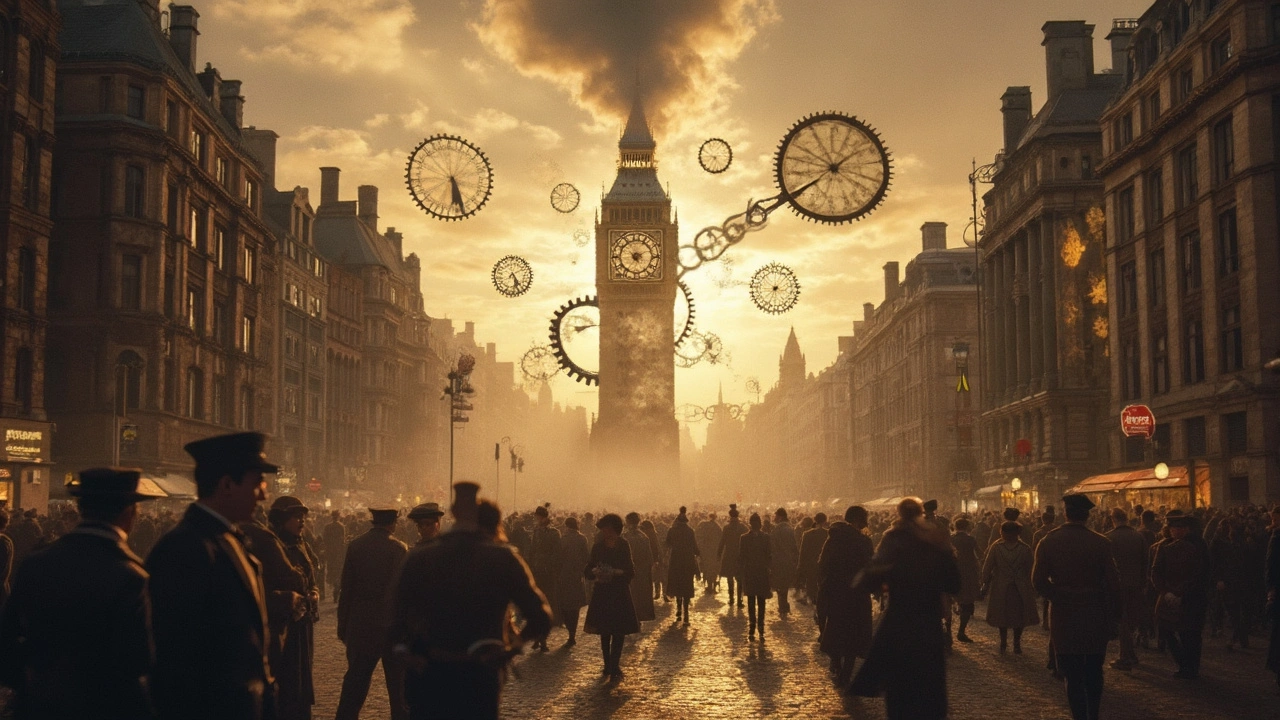
Picture this: in just one moment, life as everyone knew it was over. The air changed, priorities shifted, and what seemed impossible became reality. World-changing events don't wait for your coffee to cool or your train to show up—they crash in, knocking everything sideways. When you ask what single event changed the world the most, you're really digging for the heart of every news headline and history lesson.
Think about how the way you talk, work, or even get your groceries feels normal today—none of that is random. There's one event that's basically the blueprint. Once it happened, people started seeing the world (and themselves) in a whole new light. Lives got easier and more complicated at the same time. A few people saw what was coming, but most just got swept along.
Most folks don't realize how much this event is wired into their day. Just look at the tech in your pocket or the street outside your window. Finding out how it all links back? That’s the real power move. Understanding it means you won't just accept the world—you’ll actually get why it works the way it does and maybe even spot the next big change on the horizon.
- The Event That Flipped Everything
- How It Unfolded
- The Ripple Effect Across Life
- What It Means for Us Now
The Event That Flipped Everything
So, which moment takes the crown for world-changing events? It’s tough to beat the Industrial Revolution. This wasn't just a local thing—it spread from Britain to the globe and changed how everyone lived, ate, worked, and even thought. Before factories took over, folks mostly worked the land. After? Cities exploded, time became money, and inventions started coming out of nowhere.
Imagine the world before. No trains, no phones, people rarely left the village they were born in. Then around the mid-1700s, steam engines, spinning machines, and coal-fired everything burst onto the scene. Within a couple generations, whole towns went from sleepy to non-stop buzzing. Even things that seem basic now, like getting a steady job in a city or checking the clock, come straight from this era of non-stop change.
You might think massive change always means chaos, but the Industrial Revolution had some upsides you probably use every day:
- Goods got cheaper and more available—clothes, tools, and even books stopped being rare treats.
- Travel sped up—stagecoaches and horse-drawn carriages gave way to trains and steamships.
- People moved. In 1801, less than 20% of Brits lived in cities; by 1901, it was over 75%.
- Wages for many went up, and families had more stuff than before, even if it meant tough factory jobs.
Here’s a snapshot of how things shifted in Britain during that time:
| Year | Population (Millions) | Percentage in Cities |
|---|---|---|
| 1750 | ~6 | ~15% |
| 1851 | ~21 | ~54% |
| 1901 | ~38 | >75% |
That spike in world-changing events was real. The Industrial Revolution’s shockwaves set the stage for everything from World War conflicts to smartphones—no going back after that.
How It Unfolded
The Industrial Revolution didn’t look like a big deal at first. It started quietly in late 1700s Britain, not with a bang but with a buzz of machines in damp workshops. What kicked it all off? Steam power. Before steam engines, people relied on muscles—mostly their own or their animals’—to get stuff done. But once inventors like James Watt made the steam engine work smoother and cheaper, everything began to speed up.
The world-changing events rolled out in stages. At first, new machines wove fabrics and spun cotton faster than anyone ever dreamed. Factories popped up around rivers and coal mines—rural folks left farms because factories promised better pay. This was right around the 1760s and 1770s in places like Manchester and Birmingham.
- The first steam-powered trains and boats showed up in the early 1800s, shrinking travel time massively.
- Iron and steel production went up, making buildings, bridges, and even cities shoot skyward.
- By 1850, about half the world’s textiles were being produced in Manchester alone.
This shift was messy. London and northern cities grew way faster than their streets or sewers could handle. In 1842, Edwin Chadwick published a shocking report showing that city kids barely reached their seventeenth birthday, mostly because of bad water and air. But even with all the grime, people kept pouring into cities—chasing paychecks and new gadgets.
Here’s a quick look at how fast things escalated:
| Year | Major Milestone |
|---|---|
| 1769 | James Watt patents the efficient steam engine |
| 1804 | First steam-powered train is tested |
| 1837 | First telegraph sent, changing communication |
| 1851 | The Great Exhibition in London shows off industrial power |
The basic flow? Steam powered machines, folks moved from fields to factories, cities exploded, and suddenly modern life was underway. Not everyone benefitted—factory work was harsh and not exactly safe. But the way things changed set the stage for every convenience and headache since.

The Ripple Effect Across Life
When you zoom in on just how much this single event shaped daily life, it’s wild. Take the Industrial Revolution—the moment the world truly flipped. Before that, people mostly lived and worked out in the country, using hand tools and muscle for just about everything. Then those noisy factories popped up in cities, and suddenly, nothing stayed the same. It didn’t just give us more 'stuff'—it set off a chain reaction that hit homes, jobs, health, and even what we eat.
A handful of straightforward changes that came rolling in, thanks to the Industrial Revolution:
- World-changing events: The shift from handmade to machine-made opened the door to everything from affordable clothes to speedy trains.
- City life boom: Cities exploded in size. In England, urban populations doubled in half a century. That's more folks in closer quarters, meaning new jobs but also new problems—think air pollution and crowded streets.
- Work shifts: Work became a clock-in, clock-out thing. The daily grind kicked off right here, turning job schedules predictable but often rough, with 12-hour days common for adults and kids alike.
- Health jumps (and drops): Factories meant risky jobs and filthy air, but they also pushed doctors to clean up hospitals and invent vaccines that still save lives today.
If you look at your phone or computer, remember: mass production started it all. No factories, no cheap gadgets. Even the idea of 'working from home' wouldn’t exist without those first steam-powered workplaces showing how jobs can change with tech.
Here's a quick look at how things changed in the UK from 1800 to 1900:
| Year | % Urban Population | Avg. Workday (hours) | Life Expectancy (years) |
|---|---|---|---|
| 1800 | 20% | 12+ | 40 |
| 1850 | 40% | 10-12 | 45 |
| 1900 | 77% | 8-9 | 50 |
Modern life—whether you’re riding the Tube, clicking 'order now', or visiting an NHS clinic—all spins out from those first machines humming in the dark. Once people got a taste for what could be built in a factory, nobody ever wanted to go back to the old slow way again. That’s a ripple you can see every time you step outside.
What It Means for Us Now
So, how's that world-changing event still twisting our routines today? Let's zoom in. You can't step outside or even scroll through your phone without feeling its impact. Before this moment, a trip to a different country was a multi-week mission—and you can forget about Netflix, group chats, or even reliable news. Now, thanks to the arrival of the internet, those walls have basically vanished.
Look at the numbers: 98% of people in the UK used the internet in 2024 for everyday stuff. Work-from-home jobs, streaming culture, video calls—none of it happens without this watershed moment. Shopping, dating, learning, and catching up with mates? All easier, all changed forever, because of *the* most world-changing event in living memory.
The Guardian summed it up best: "The internet hasn’t just created a connected world. It’s become the backbone for how we live, work, and learn every single day."
If you want your day to run smoother, here are some ways everyday people are making this digital revolution work for them:
- Online banking keeps tabs on money without waiting for monthly statements.
- Remote medical consultations save hours spent in waiting rooms.
- Virtual volunteering lets people help others, no matter their postcode.
- Parents get instant updates about their kids’ schools (sometimes too many).
But here's a stat to chew on—according to Ofcom, UK adults spend just under 6 hours online on average per day. That’s most of your waking hours! It shows just how tightly the internet wraps around our habits, choices, and even what we think is normal.
So next time you fire up your laptop or swipe through your favorite app, remember: it's all the knock-on from one huge event. Recognize it, use it, and maybe keep an eye out for the next world-flipper around the corner.